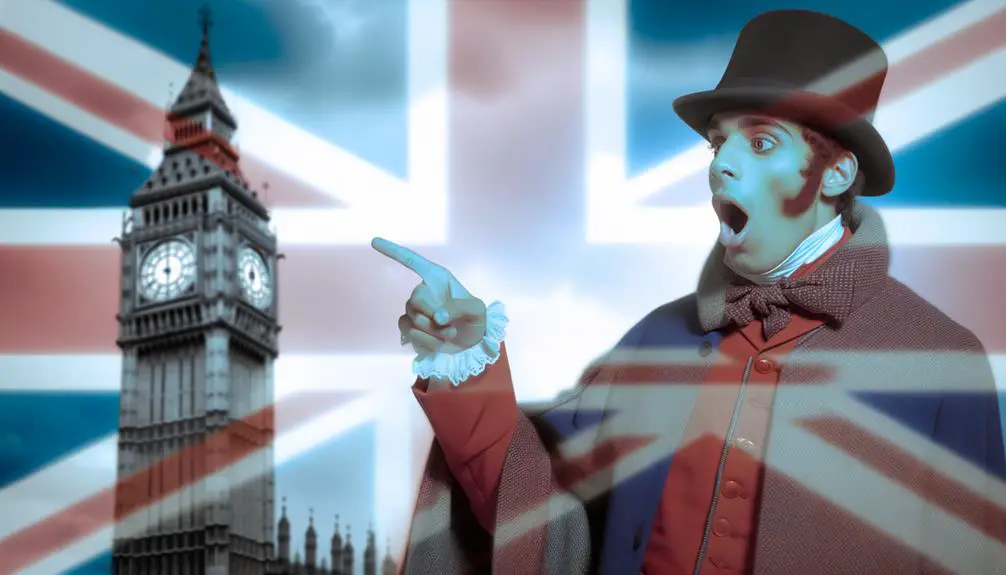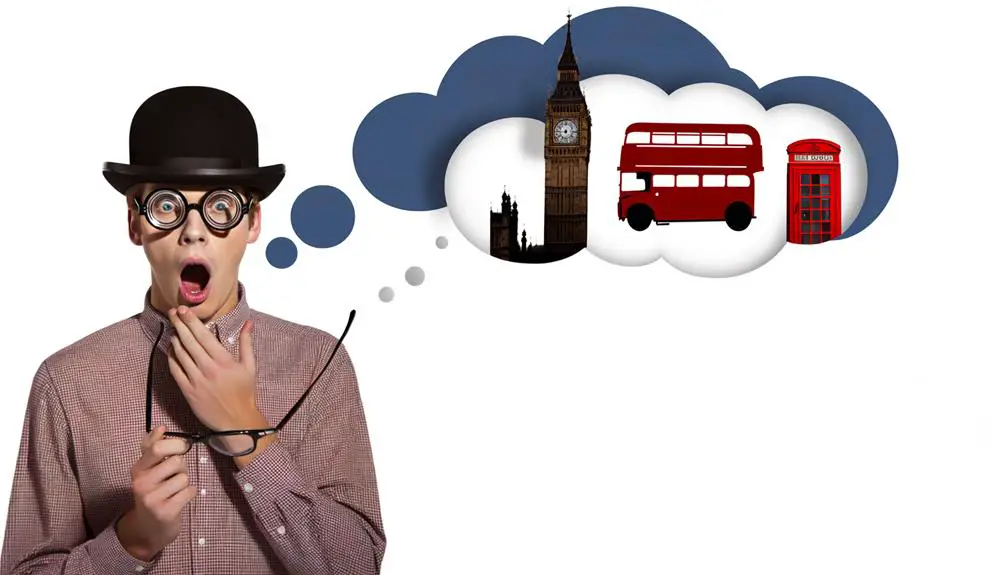In British slang, "blimey" is your go-to expression for surprise or astonishment. It's a softer, more polite version of saying "God blind me," avoiding direct blasphemy. This term isn't just a word; it's a reflection of a broad cultural identity, punctuating sentences with a distinctively British flavor. Its origins are deeply religious, yet today, it's used secularly to convey shock or disbelief. You'll find "blimey" across various British regions, each adding its unique twist. In media and literature, it adds authenticity, tying characters closer to their British roots. Unpacking its layers reveals the complexity of British slang and its evolution, offering insights into cultural nuances and linguistic heritage.
Key Takeaways
- Blimey is a British slang term expressing surprise or astonishment.
- It originated as a contraction of "God blind me," used to avoid blasphemy.
- The term reflects British cultural values of politeness and understatement.
- Blimey is widely used across the UK, with regional variations in pronunciation.
- It remains popular in modern British culture, symbolizing quintessential Britishness.
The Origin of Blimey

Delving into the origin of 'blimey,' it's clear this British slang term has a fascinating history rooted in religious exclamations. The etymology debate surrounding 'blimey' is robust, reflecting the term's evolution from a phrase expressing surprise or strong emotion. Historically, 'blimey' is a contraction of "God blind me," a phrase that encapsulates the speaker's shock or astonishment so profound that it would only be justifiable by divine intervention. This religious undertone highlights the term's deep-seated origins in the English lexicon.
As you explore 'blimey's' journey from its religious beginnings to a common expression of surprise, it's evident that its usage has transcended its original context, becoming less about literal sightlessness and more about capturing a moment of intense emotional reaction. The global adoption of 'blimey' speaks volumes about the fluidity of language and how expressions can evolve and spread far from their initial roots. It's not just confined to British English anymore but has found its way into various cultures and dialects, showcasing the dynamic nature of language and how it adapts to changing societal norms and interactions.
Blimey Defined
At its core, 'blimey' is an expressive British slang term that conveys surprise or astonishment, often used to emphasize a speaker's reaction to an unexpected event or piece of news. This term is deeply embedded in the fabric of British colloquial speech, with its historical usage tracing back centuries. Initially, it served as a euphemism to avoid blasphemous expressions, evolving from 'God blind me' to the more socially acceptable 'blimey'. This linguistic metamorphosis highlights the adaptability and creativity inherent in spoken language, especially within the context of cultural and religious sensibilities.
In terms of global perceptions, 'blimey' carries a distinctly British connotation, often associated with quintessentially British characteristics such as politeness, understatement, and a penchant for quirky expressions. For non-British speakers, encountering 'blimey' can signal an immediate recognition of British identity, underscoring the term's effectiveness in communicating not just surprise, but a specific cultural flavor. This global awareness also speaks to the widespread influence of British media, literature, and entertainment, through which terms like 'blimey' have been disseminated and embraced by international audiences, further cementing its place in the lexicon of English slang.
Usage in British Culture

Within British culture, 'blimey' serves as a versatile expression that captures a wide range of emotions, from shock to sheer amazement, reflecting the nation's unique linguistic heritage and social customs. This single word encompasses the British penchant for understatement and politeness, often used to express surprise without resorting to profanity. Its usage speaks volumes about the cultural implications of language in conveying emotions while maintaining a certain level of decorum.
From a broader perspective, 'blimey' also sheds light on international perceptions of British culture. To outsiders, its use is emblematic of quintessential Britishness, evoking images of quaint villages and bustling, foggy London streets as depicted in literature and film. It serves as a linguistic marker that distinguishes British English from its global counterparts, enriching the tapestry of world languages with its charm and idiosyncrasy.
Understanding 'blimey' offers more than a glimpse into British slang; it opens a window into the values and attitudes that define British society. Its prevalence and endurance underscore a collective identity that cherishes subtlety and wit, marking 'blimey' as more than a mere exclamation—it's a cultural artifact.
Variations Across Regions
Exploring the linguistic landscape of the United Kingdom reveals that 'blimey' isn't a one-size-fits-all expression; its pronunciation and usage can vary considerably from one region to another. The dialectical influences and expression evolution manifest vividly as you traverse the country, reflecting the rich tapestry of British regional identities.
- In the bustling streets of London, 'blimey' is often crisp and fast-paced, mirroring the city's dynamic rhythm. It serves not only as an expression of surprise but also as a versatile addition to the urban lexicon, blending seamlessly with the multicultural influences that shape the capital's linguistic trends.
- Crossing into the West Midlands, the pronunciation becomes rounder, the expression drawn out into a warmer, more leisurely 'bloimey'. Here, it carries a heartier weight, embodying the region's friendlier, more communal spirit. It's a reflection of the slower pace of life and the importance of personal connections.
- Venturing north to Scotland, 'blimey' transforms under the influence of the Scottish brogue, becoming rarer and often replaced by local expressions. When used, it's distinctly accented, showcasing the linguistic diversity that characterizes the United Kingdom's regional dialects.
This variation underscores the importance of dialectical influences in the evolution of expressions like 'blimey', painting a picture of a word that is as adaptable and diverse as the people who use it.
Blimey in Media and Literature

Throughout the years, 'blimey' has woven its way into the fabric of media and literature, reflecting its enduring presence in British culture. It's a word that's been used to convey surprise, astonishment, or even disbelief, often shaping character reactions in a way that's both authentic and deeply rooted in the vernacular. When you investigate into classic British novels or tune into television shows from the UK, you'll notice how 'blimey' punctuates dialogues, adding a layer of realism and emotional depth.
The evolution of slang, including 'blimey', in media and literature, offers a fascinating lens through which to view changes in society and language. Writers and screenwriters have skillfully employed it to mirror societal attitudes, capturing the essence of the British ethos. As you explore various media, you'll see that 'blimey' serves not just as a filler word but as a cultural marker, signaling moments of intense emotion or surprise.
This incorporation into media and literature not only demonstrates the word's flexibility and staying power but also enriches our understanding of character reactions and the dynamics of slang evolution. Through its continued use, 'blimey' remains a confirmation to the vibrancy and resilience of British slang.
Understanding British Slang
Having examined 'blimey' in media and literature, let's now broaden our understanding of British slang as a whole, pondering its complexities and nuances. The evolution of slang is not just a linguistic journey; it's a reflection of societal change, embodying the cultural significance of the times. To grasp the essence of British slang, you need to appreciate its dynamic nature, where new expressions emerge, and older ones fade away or evolve in meaning.
Here are three key points to ponder:
- Slang Evolution: British slang is never static. It morphs with generations, drawing from diverse influences including immigration, popular culture, and technological advancements. This evolution is a sign of the adaptability and creativity of language.
- Cultural Significance: Slang serves as a cultural gauge, offering insights into the values, attitudes, and humor of British society. It's a form of social currency, signifying belonging and identity within various groups.
- Regional Variations: The UK's rich tapestry of accents and dialects contributes to a varied slang vocabulary. Understanding these regional nuances is essential for anyone looking to fully comprehend British slang.







